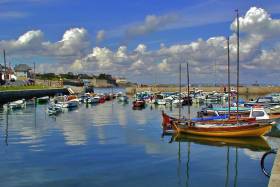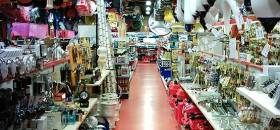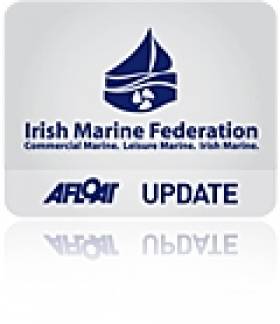Displaying items by tag: Western Marine
#BullochHarbour - Permission is being sought to develop a mixed housing and commercial scheme at the former premises of Western Marine at Dalkey’s Bulloch Harbour.
The planning application by Bartra Property Ltd calls for the demolition of the existing warehouses on the waterfront site before the construction of three detached houses and six terraced homes over “marine-based activity units” and a quayside café.
Western Marine bade farewell to Bulloch Harbour after 48 years this past April ahead of a relocation to new chandlery premises which has yet to be announced.
Meanwhile, the new development is being closely watched by the newly formed Bulloch Harbour Preservation Group, comprising local residents, boat users and Dalkey Community Council.
Western Marine of Dalkey in County Dublin celebrates fifty years in business in 2016 and marked its last day at its waterfront showrooms earlier this month. The landmark Dublin Bay premises has been sold and the long established Irish marine firm is relocating after 48 years at its Bulloch harbour site.
Doors closed in the Bulloch Harbour showrooms on April 2nd after a 'bonanza' relocation sale. A new location for the chandlery and boat sales store has yet to be announced. 'Details of our new location will be available shortly, but we can confirm we will not be moving very far!', managing director Hogan Magee told Afloat.ie
53 Degrees North Store Opens at Western Marine
53 Degrees North, Ireland's Outdoor Adventure Stores with branches already at Carrickmines and Blanchardstown - caters to Climbing, Hillwalking, Biking, Camping, Hiking, and of course watersports including Kayaking, Sailing, Surfing and Swimming.
Western Marine, Ireland's Largest Marine Distributors, was established in 1966 and is based at Bulloch Harbour since 1968. Western Marine caters to all marine markets, from sailing and motorboating to commercial workboats, and specialises in inflatable boats and RIBs as well as a huge range of marine equipment, lifesaving equipment etc.
Commenting on the new store, Western Marine's MD, Hogan Magee said "We're very enthusiastic about this venture - 53 Degrees North carry a full range of clothing, footwear and equipment from value for money through to top end premium quality products and that fits very well with our own philosophy of providing of premium quality at affordable prices.
The two ranges are complimentary, with very little product overlap, and the result is a truly comprehensive watersports display that we think is unparalleled anywhere in Ireland".
53 Degrees North MD Alan McFarlane said "We're really excited about this. Western Marine has a superb reputation in all marine markets, and the combination of the Western Marine and 53 Degrees North brands will give us both a wonderful opportunity to grow our businesses.The huge range of watersports gear which we offer now has a waterside home, and a whole new customer base. With free car parking spaces available in the adjacent boatyard, shopping with 53 Degrees North at Western Marine could not be easier"
Among the huge range of brands now available under one roof are worldwide leaders including Zodiac inflatable boats and RIBs, Teleflex steerings and engine controls, Skipper and Besto lifejackets & buoyancy aids, Icom VHFs, Gleistein yacht ropes, McMurdo EPIRBs, Harken, Lewmar, Garmin GPS, Pains Wessex Flares, Musto, Helly-Hansen and Henri-Lloyd sailing clothing, Dubarry marine footwear, O'Neill wetsuits, Oakley eyewear, surfboards by Cortez, and kayaks by Islander and Wilderness.
The new store is open 7 days a week throughout the Summer, with opening hours 9am to 6pm Monday through Saturday, and 1pm to 6pm on Sunday
Dublin Boat Show Goes Afloat
The 2011 Dublin Boat Show is going on the water in 2011 if a new approach to promote boating in Ireland takes off. The Irish Marine Federation (IMF) aims to include as many boating activities as possible in the national boat show line up next May in Malahide.
An attendance of up to 17,000 are expected at the Malahide marina venue from May 20 to 22. It will be the first time the national event has taken to the water in its 50 year history.
The world's biggest boat builders Beneteau, Jeanneau, Sea Ray and Sunseeker among others have already signed up for the North Dublin event, according to the IMF.
The organisers are partnering with leading Irish boating organisations to demonstrate the many different aspects of the sport on the water with a weekend schedule of live commentary.
BJ Marine, MGM Boats, Western Marine, HM Yachts in Cork and Viking marine of Dun Laoghaire and Shannon Castle Line in County Clare are among the first of the Irish firms to express interest in the new format as exhibition details circulate through the industry this week.
The aim is to get as many class associations on the water as well as small powerboat racing such as Zzapcats, kayaking and match racing fans to stage short, sharp events on the estuary directly in front of the marina. A timetable of events will be published shortly.
Coastguard and Lifeboat demonstrations are also planned. Technical demonstrations such as glass fibre repairs and engine maintenance are also in the line up.
Despite the coastal setting Ireland's Inland waters will feature prominently too through the Irish Boat Rental Association who will be promoting holidays on the river Shannon and Erne.
Visitors are also expected from Wales and across the Irish Sea region and special offers to both show-goers and exhibitors are being made through an Irish Sea InterReg programme.
The Malahide exhibition site will feature a marine village ashore with over 500 square meters of undercover exhibit space. Show goers will get the chance to talk to the leading lights in the sport before going afloat on the marina where over 100 berths will be available.
"It's a pretty unique site that gives us the best chance to show off the marine leisure industry afloat and ashore. Because its just off the M50 and M1 motorways it means it's also so easy to get to from anywhere in the country. This will be a great day out." said the Federation's Steve Conlon.
More information from Steve Conlon on 087 6472746. Updates here on afloat.ie as the show takes shape.

































































